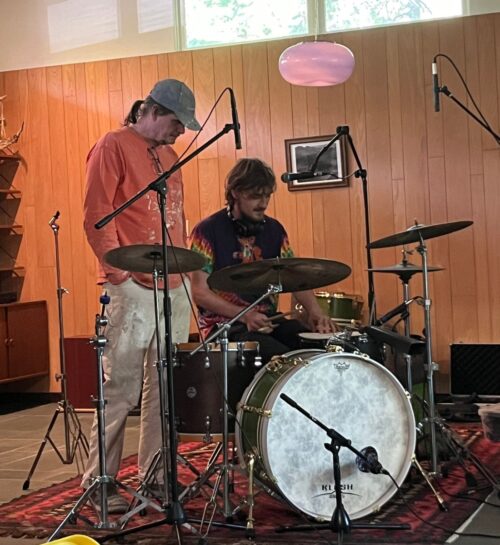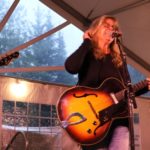Saltydog talks creative process, recording at Erickson house

Members of the band Saltydog on West Michigan Street near Bent Paddle Brewing in July 2023: Sam Deters, Owen Mahon, Gavin St. Clair, Jacob Mahon, Calvin Lund and Bryan Johnson. (Photo by Aaron Reichow)
Saltydog isn’t new anymore, hence the dropping of “New” from the band name. The Duluth-born jam band has accumulated an impressive cult following over the past seven years, playing venues across Minnesota and Wisconsin, including Duluth’s Bent Paddle Brewing on Monday nights. An enthusiastic group of funk and blues lovers seem to follow the band from show to show, along for the improvisational ride Saltydog takes them on.
The group currently consists of Jacob “Curly J” Mahon on guitar, Owen “Owie” Mahon on drums, Calvin “Calzone” Lund on bass, Sam “Samtana” Deters on guitar, Bryan “Lefty” Johnson on auxiliary percussion and Gavin St. Clair on keys.
As certain members have come and gone, the band has been through several name changes. At the start in 2017, it was the Jacob Mahon Trio. Soon after it was Jacob Mahon & the Salty Dogs. Then in 2020 the group became New Salty Dog.
“Now we’re just plain Saltydog,” said Jacob Mahon.
The first version of the group consisted of brothers Owen and Jacob Mahon, but the band soon grew and evolved.
“Once we started adding more people … there’s changes that you want to make,” said Owen Mahon, “We just wanted to represent everybody. And we’re not new anymore.”

Curtis Bellows (left) consults with Owen Mahon (right) on the drum set in the Erickson house. (Photo by Delaney Shipman)
The switch to simply “Saltydog” preceded the release of a new album, Pepper, which dropped on June 3. The band is already recording tracks for the next album, to be released sometime in 2025.
Pepper was recorded at Sparta Sound Studio, about 45 miles north of Duluth. The next album is being laid down at a more unusual location: a home on stilts over a creek in eastern Duluth. The Erickson house has been covered by multiple news outlets for its captivating architecture. It’s a 1960s time capsule: wood paneling, a standalone kitchen, tall windows and a living room made for entertaining. The artful and acoustic nature of the home made it a prime space for Saltydog to record.

Owen Mahon looks over 34th Avenue East Creek, which flows below the overhang of the Erickson house. (Photo by Delaney Shipman)
The band fell into the home in an unusual way. Curtis Bellows was doing work on it for Peter Gessel, the owner. Bellows is close with the band, and thought the space would be an ideal place to record. He brought the proposition to Gessel, who took some time to think about it, but ultimately decided he wanted the space to be used for art, and the creative endeavor that Saltydog would use it for would be exactly that. Saltydog was on board too, believing that “beauty promotes beauty,” as Jacob Mahon said.
Saltydog had a few weeks in June to use the Erickson house, and they recorded there for 20 hours a week. Though Gessel was fairly strict about the 5 to 10 p.m. time slot that they used the house for, the beautiful home was still far better than where they began recording the album before moving to the Erickson house: Owen Mahon’s basement, which St. Clair declared “dark and stinky.”
The band was grateful for the one-off opportunity to use the home, and leaned into its charm for inspiration: as the spring buds formed and flowered outside the Erickson house’s floor-to-ceiling windows, Saltydog’s process flourished.
“It’s kind of a spring, sun soaked, wind blown thing — and we wrote (the songs) like, last summer, too — the whole thing. ‘Hatches’ was written about a bonfire. That whole thing, man, just tapping into whatever natural source, instead of like a super isolated, padded studio that costs $1,000. Or like, the song came from this place, we want to capture this place,” St. Clair said.
The members say this ephemeral timeframe to create the springtime album has made the recording process feel very capsulated.
“And in 20 years, I will always remember that. But yeah, like a memorable occasion, one-hour long, snippet of time,” said Johnson.
The sessions blur together, resulting in one contained memory of the process.

Gavin St. Clair (right) adjusts a mirror so that Bryan Johnson(left) can see Owen Mahon on the other side of a wall. (Photo by Delaney Shipman)
From the band’s time recording, one “rule” emerged: don’t overwork a song. On an average recording day, the band goes through the set list one by one. The members try not to repeat a song and to go in order, which helps them from getting tired of a certain song. These intentional jam sessions result in multiple one-off takes of each song that are fresh and relaxed.
One pro of having only a short time to work in this inspirational home is that the band has fewer options to choose from when putting together the final cut of the album. Choice paralysis plagues some: which India pale ale to purchase, which regional lighthouse to visit, etc., and that includes Saltydog. In this case, they’re “making a record faster than we would if we had all the time in the world to do it,” Jacob Mahon said, noting it’s a “huge peace of mind that we’re only going to have like, a few takes of each song to pick as opposed to like 10 takes of every song.”
It’s likely that each take will be different from the previous, since the group actively improvises not only during performances and rehearsals, but during recording as well.

Calvin Lund plays bass and monitors the sound of the group on his recording equipment. (Photo by Delaney Shipman)
As Saltydog improvises, it’s important that each member trusts each other. If Jacob Mahon goes somewhere, the others follow and let him solo. The band makes this look easy, but improvising holds the potential for being what St. Clair calls “a big soupy mess” if they each play their own ideas all at the same time. It’s a delicate art that deeply depends on being aware and intentional about what you’re doing.
“If you’re not doing it in a present way, it can actually end up being less spontaneous because you just revert to your just muscle memory stuff,” St. Clair said. “That’s kind of a stoner soup thing. It can actually be more boring that we’re all improvising. But we try to avoid that as much as possible.”
And for Saltydog, the audience is a crucial part of the musical experience. There’s a sort of energy loop, where the ‘Dogs play off of what the audience is responding to.
“I remember when I first joined the band,” St. Clair said, “I realized I had never been in a band where the song is such a living, breathing thing, and the audience is breathing into it. And so the song is never the same, because the audience is never the same, and we could do something Friday night and try it again Monday, and everyone starts to kind of like check their phones and do something else. And it’s like, nope, not working tonight. But for the most part, we’re always kind of like looking around.”
Even though the members of Saltydog appear relaxed when performing, they maintain a level of structure and accountability to uphold the integrity of their music. They know what works because they’ve seen what doesn’t.
Given that Saltydog has changed and shifted over time, they are still more popular than ever and seem to have found their groove in the Duluth music scene. Many members of the band participate in other side projects and bands that are concurrent with Saltydog. Music goers may find themselves at Bent Paddle anticipating a band called “Curly J” only to find out that Curly J is Jacob Mahon’s stage name, and Sam and Calzone are also there to back him up. The line between Saltydog and other jam bands is sometimes thin, but that’s how Duluth’s music scene rolls. Just like their creative process, Saltydog is a fluid, living thing, taking things one jam session at a time.
Recommended Links:
Leave a Comment
Only registered members can post a comment , Login / Register Here














No Comments